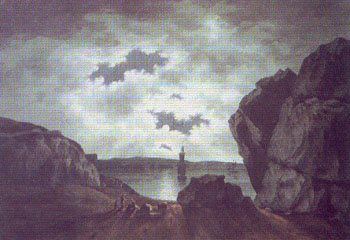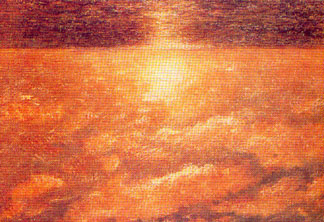Lord Byron, Percy Shelley, & Mary Shelley


 |
 |
There is a rapture on the lonely shore, There is society, where none intrudes, By the deep sea, and music in its roar; I love not man the less, but nature more, From these our interviews, in which I steal From all I may be, or have been before, To mingle with the universe, and feel What I can ne'er express, yet cannot all conceal.
Roll on, thou deep and dark blue ocean-roll!
His steps are not upon thy paths-thy fields
The armaments which thunderstrike the walls
Thy shores are empires, changed in all save thee-
Thou glorious mirror, where the Almighty's form
And I have loved thee, ocean! and my joy |
1. In lines 1-36, how does the speaker portray the relationship between the ocean and human beings? What do these lines suggest about the ability of human beings to master nature? 2. In lines 37-54, how does the speaker contrast the nature of the ocean with the fortunes of human beings? What can you infer from this contrast? 3. In the last stanza, how does the speaker describe his boyhood relationship with the ocean? What do the first and last stanzas reveal about the speaker? Evaluate and Connect |
Of cloudless climes and starry skies; And all that's best of dark and bright Meet in her aspect and her eyes: Thus mellowed to that tender light Which Heaven to gaudy day denies.
One shade the more, one ray the less,
And on that cheek, and o'er that brow, |
1. To what does the speaker compare the woman? Use details from the poem to explain what you learn about her from this comparison. 2. Besides beauty, what other qualities does the woman have, according to the speaker? What can you infer about the speaker's feelings toward her? Evaluate and Connect |
Who said: `Two vast and trunkless legs of stone Stand in the desert. Near them, on the sand, Half sunk, a shattered visage lies, whose frown, And wrinkled lip, and sneer of cold command, Tell that its sculptor well those passions read Which yet survive, stamped on these lifeless things, The hand that mocked them and the heart that fed. And on the pedestal these words appear -- "My name is Ozymandias, king of kings: Look on my works, ye Might, and despair!" Nothing beside remains. Round the decay Of that colossal wreck, boundless and bare The lone and level sands stretch far away.' |
1. What does the traveler describe? What specific details help you visualize what is being described? 2. According to the traveler, what was the sculptor's attitude toward the subject? On what evidence does the traveler base this conclusion? 3. What words appear on the pedestal? What do these words suggest about Ozymandias's personality and character? 4. How does the traveler describe the area where the ruins lie? What does this description seem to suggest about the nature of power and fame? Evaluate and Connect |
Thou, from whose unseen presence the leaves dead Are driven, like ghosts from an enchanter fleeing,
Yellow, and black, and pale, and hectic red,
The winged seeds, where they lie cold and low,
Her clarion o'er the dreaming earth, and fill
Wild Spirit, which art moving everywhere;
Thou on whose stream, mid the steep sky's commotion,
Angels of rain and lightning: there are spread
Of some fierce Maenad, even from the dim verge
Of the dying year, to which this closing night
Of vapours, from whose solid atmosphere
Thou who didst waken from his summer dreams
Beside a pumice isle in Baiae's bay,
All overgrown with azure moss and flowers
Cleave themselves into chasms, while far below
Thy voice, and suddenly grow gray with fear,
If I were a dead leaf thou mightest bear;
The impulse of thy strength, only less free
The comrade of thy wanderings over Heaven,
As thus with thee in prayer in my sore need.
A heavy weight of hours has chain'd and bow'd
Make me thy lyre, even as the forest is:
Will take from both a deep, autumnal tone,
Drive my dead thoughts over the universe
Scatter, as from an unextinguish'd hearth
The trumpet of a prophecy! O Wind, |
1. In sections 1-3, the speaker describes the West Wind's effect on three aspects of nature. What are those aspects? What do you learn about the speaker's view of the West Wind from these descriptions? 2. What relationship between himself and the West Wind does the speaker suggest in section 4? What do you think he is seeking? How does he think the West Wind can help? 3. In section 5, what does the speaker ask of the West Wind? What would the wind's help allow him to do? What does this request tell you about the speaker? 4. What is your interpretation of the last line of the poem? How does this line help you better understand what the West Wind symbolizes, or represents, for the speaker? Evaluate and Connect |
Bird thou never wert, That from Heaven, or near it, Pourest thy full heart In profuse strains of unpremeditated art.
Higher still and higher
In the golden lightning
The pale purple even
Keen as are the arrows
All the earth and air
What thou art we know not;
Like a poet hidden
Like a high-born maiden
Like a glow-worm golden
Like a rose embowered
Sound of vernal showers
Teach us, sprite or bird,
Chorus hymeneal
What objects are the fountains
With thy clear keen joyance
Waking or asleep,
We look before and after,
Yet if we could scorn
Better than all measures
Teach me half the gladness |
1. In lines 1-30, what words and images (see page R8) help you imagine the skylark's flight and its song? Describe the speaker's attitude toward the skylark. 2. To what people or things does the speaker compare the skylark in lines 31-60? What qualities of the skylark do these comparisons suggest? 3. How does the speaker characterize the skylark's song? What does the speaker claim would happen if he could gain the skylark's gift? What does this suggest to you about Shelley's views of creativity and art? Evaluate and Connect |
1. Why does Shelley write this account of the origin of her story even though she claims she is "averse to bringing herself forward in print"? What does this contradiction tell you about her personality? 2. According to the second paragraph, what childhood activity did Shelley find more "agreeable" than writing? How did Shelley's parents and husband influence her as a writer? 3. What does Shelley claim is necessary for invention? Describe the events that led up to her idea for the plot of Frankenstein. Do these factors support her theory of invention? 4. What do Shelley's reflections in the last paragraph tell you about her life? Evaluate and Connect |